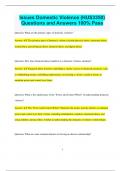Issues Domestic Violence (HUS3350)
Questions and Answers 100% Pass
Question: What are the primary types of domestic violence?
Answer: ✔✔ The primary types of domestic violence include physical abuse, emotional abuse,
sexual abuse, psychological abuse, financial abuse, and digital abuse.
Question: How does financial abuse manifest in a domestic violence situation?
Answer: ✔✔ Financial abuse involves controlling a victim’s access to financial resources, such
as withholding money, forbidding employment, or misusing a victim’s credit or assets, to
maintain power and control over them.
Question: What is the significance of the "Power and Control Wheel" in understanding domestic
violence?
Answer: ✔✔ The "Power and Control Wheel" illustrates the tactics used by abusers to maintain
power and control over their victims, including intimidation, isolation, emotional abuse, and
using children, among others. It helps in understanding the dynamics of abusive relationships.
Question: What are some common barriers to leaving an abusive relationship?
1
,Answer: ✔✔ Common barriers include fear of increased violence, financial dependency,
emotional attachment, concern for children, lack of support systems, cultural or religious beliefs,
and fear of not being believed or understood by others.
Question: How does the cycle of violence perpetuate in domestic violence situations?
Answer: ✔✔ The cycle of violence typically involves a tension-building phase, an acute
battering incident, and a honeymoon phase where the abuser may apologize or be affectionate,
leading to a temporary reconciliation before the cycle begins again.
Question: What role do law enforcement agencies play in responding to domestic violence
cases?
Answer: ✔✔ Law enforcement agencies respond to domestic violence cases by providing
immediate protection for victims, enforcing restraining orders, investigating incidents, arresting
perpetrators, and collaborating with victim support services.
Question: How can domestic violence impact a victim's mental health?
Answer: ✔✔ Domestic violence can lead to severe mental health issues such as depression,
anxiety, post-traumatic stress disorder (PTSD), low self-esteem, suicidal thoughts, and substance
abuse.
2
,Question: What are some strategies for safely intervening when you suspect someone is a victim
of domestic violence?
Answer: ✔✔ Safe intervention strategies include offering support and listening without
judgment, providing information about resources and services, helping them develop a safety
plan, and, if safe, involving law enforcement or domestic violence professionals.
Question: How does domestic violence affect children who witness it?
Answer: ✔✔ Children who witness domestic violence may experience emotional and behavioral
problems, including anxiety, depression, aggression, difficulties in school, and a higher
likelihood of entering abusive relationships in adulthood.
Question: What are the legal options available for victims of domestic violence?
Answer: ✔✔ Legal options for victims include obtaining restraining orders or protective orders,
pressing charges against the abuser, seeking custody of children, and accessing legal aid for
representation in court.
Question: Why is it essential to address domestic violence in underserved communities?
Answer: ✔✔ It is essential because underserved communities may face additional barriers such
as language barriers, lack of access to resources, cultural stigmas, and distrust of law
enforcement, which can prevent victims from seeking help and support.
3
, Question: What role do cultural norms and values play in the perpetuation of domestic violence?
Answer: ✔✔ Cultural norms and values can perpetuate domestic violence by reinforcing gender
roles, discouraging victims from seeking help, promoting tolerance of abuse, and stigmatizing
those who speak out against it.
Question: How can domestic violence prevention programs be effective in reducing incidents of
abuse?
Answer: ✔✔ Prevention programs can be effective by educating individuals and communities
about healthy relationships, raising awareness of the signs of abuse, providing resources and
support for at-risk individuals, and promoting social norms that reject violence.
Question: What impact does domestic violence have on the workplace?
Answer: ✔✔ Domestic violence can impact the workplace by leading to decreased productivity,
increased absenteeism, safety concerns for the victim and coworkers, and potential legal
liabilities for the employer.
Question: What is the importance of confidentiality when working with domestic violence
victims?
4





